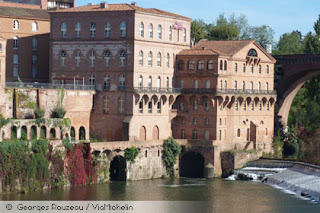Tripatini
the world's smartest travel social network
The "UNESCO Effect" in Albi, France
The ‘UNESCO Effect’ waits for no one. On July 31, 2010, a few minutes after Albi’s inclusion on the UNESCO World Heritage list was made public, the city was unexpectedly stormed by waves of tourists who had been visiting France’s South-West, soon to be followed by eager tour operators. Local hotels were besieged. During the rest of the summer, the cathedral and the Toulouse-Lautrec Museum saw a 30 % increase in visitors and L’Esprit du Vin, the city’s Michelin-starred restaurant, was fully booked for lunch and dinner during the entire month of August. Recently we saw buses filled with Japanese tourists and a crew from the Japanese TV station NHK busily filming a 26-minute feature about the red city.
Albi la Belle, a red city that looks like it might belong in Lombardy, well deserves the public’s admiration. Its classified area is a twenty-hectare gem which includes the Sainte-Cécile Gothic cathedral, the adjoining Palais de la Berbie, the Saint-Salvi collegiate church (Albi’s oldest religious structure, dating from the early 11C), the Old Bridge (also from the 11C) and parts of the banks of the River Tarn. The city, whose glory days were in the 16C during the peak of the world trade, harbors several venerable old quarters which are extraordinarily well-preserved and conscientiously showcased.
Around the cathedral - something of an enormous brick elephant which truly looks like it belongs in Gotham City - are old private manors and half-timbered houses with corbelled features. Albi has an excellent quality of life (à la south of France) and is peppered with fine establishments of all genres. From the organic wine bar to the Michelin-starred restaurant; from the 18C flourmill transformed into a hotel to the sustainable design boutique, Albi is full of surprises. That the city has not been engulfed by nearby Toulouse is a gift to us all.
Practical Information from the Centre Départemental de Tourisme du Tarn:
Michelin-starred Restaurant:
L’Esprit du Vin:
Like many of his peers nowadays, David Enjalran, the chef at L’Esprit du Vin (one Michelin star), has got rid of the heavy yoke of his elaborate old menu in order to better devote his talents to the ingredients and inspiration of the moment. While his roots are firmly planted in his region, he tends to wander, taking patrons along for ever-interesting culinary journeys.
Albi la Belle, a red city that looks like it might belong in Lombardy, well deserves the public’s admiration. Its classified area is a twenty-hectare gem which includes the Sainte-Cécile Gothic cathedral, the adjoining Palais de la Berbie, the Saint-Salvi collegiate church (Albi’s oldest religious structure, dating from the early 11C), the Old Bridge (also from the 11C) and parts of the banks of the River Tarn. The city, whose glory days were in the 16C during the peak of the world trade, harbors several venerable old quarters which are extraordinarily well-preserved and conscientiously showcased.
Around the cathedral - something of an enormous brick elephant which truly looks like it belongs in Gotham City - are old private manors and half-timbered houses with corbelled features. Albi has an excellent quality of life (à la south of France) and is peppered with fine establishments of all genres. From the organic wine bar to the Michelin-starred restaurant; from the 18C flourmill transformed into a hotel to the sustainable design boutique, Albi is full of surprises. That the city has not been engulfed by nearby Toulouse is a gift to us all.
Practical Information from the Centre Départemental de Tourisme du Tarn:
Michelin-starred Restaurant:
L’Esprit du Vin:
Like many of his peers nowadays, David Enjalran, the chef at L’Esprit du Vin (one Michelin star), has got rid of the heavy yoke of his elaborate old menu in order to better devote his talents to the ingredients and inspiration of the moment. While his roots are firmly planted in his region, he tends to wander, taking patrons along for ever-interesting culinary journeys.
Shopping:
Le Sens des choses:
Made in France by small regional manufacturers (from Cantal to the Ariège) using recycled or recyclable natural, tactile materials (clay, cardboard, wood, wool, linen, porcelain, stoneware), the objects chosen by Séverine Paillet are ‘meaningful’ - the shop’s name in French signifies ‘The Meaning of Things’. As sustainable as they are useful, from the window planter made of linen fibre to the walking stick with a silicone handle; from the wool jewellery to the natural schistose sandstone whetting stone; from the fruit bowl made of chestnut wood from the Limousin region to the cardboard bookshelves, everything in this boutique which opened in May 2010 opposite Albi’s covered market is thought-provoking and attractive.
To watch a video of this UNESCO World Heritage city click here. For travel destination ideas click here.
Videos
Groups
-
Catalonia, Its Culture &…
33 members
-
Barcelona
77 members
-
India
173 members
-
Tour Operators
873 members
-
Ireland
93 members
-
South Dakota
17 members
-
Azerbaijan
17 members
-
Shopping the World
55 members
-
Tech for Travel/Hospital…
87 members
-
Andorra
26 members
-
Online Corner
75 members
-
Minnesota
22 members
-
Backpackers & Hostels
84 members
-
Portugal
60 members
-
Turks and Caicos
26 members
© 2026 Created by EnLinea Media.
Powered by
![]()
Badges | Report an Issue | Privacy Policy | Terms of Service

You need to be a member of Tripatini to add comments!
Join Tripatini